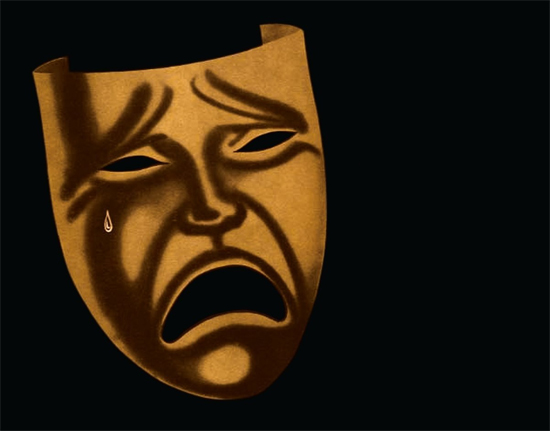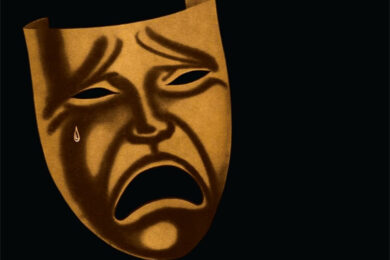I still remember it quite clearly. Standing in the middle of Virgin Megastores on Western Road in Brighton. Big chunky black headphones on, listening to ‘Perfect Day’ by Lou Reed on one of the in-store ‘listening posts’. Eyes welling up, tears running down my cheeks. The song never affected me like that before or since. No idea why it did then. I remember nothing else about that day. I can’t have been more than about 15.
"When listening to music we are often surprised," William James, the American pragmatist and psychologist, once said, "at the cutaneous shiver which like a sudden wave flows over us, and at the heart swelling and lacrymal effusion that unexpectedly catches us at intervals."
We know the brute mechanism of these watery effusions. The parasympathetic division of the autonomic nervous system activates the lacrimal gland. Nerve impulses run back and forth on the opthalmic division of the trigeminal cranial nerve. A colourless cocktail of water, mucin, urea, proteins, fats, enzymes, and sugars is secreted by the gland and overflows the tear ducts, simultaneously cleaning dust from the conjunctiva and preventing the cornea from drying out.
But there are tears and then there are tears. Emotional tears, the ones wrung from inner pain and the recognition of tragedy, have even a different chemical composition. There are proteins that are theirs alone. And the precise network of higher brain functions involved in these less obviously functional emissions remains shrouded in mystery.
Was I looking for the key to unlock this curious memory fragment when, a decade and a half from that day in Brighton town centre, I went by train to a conference on neuroaesthetics at the Zentrum für Kunst und Medientechnologie in Karlsruhe? There, among neuroscientists discussing cross-cultural differences in aesthetic appreciation and cyberneticists trying to coax their computers into ‘jamming’ with them, I encountered the work of Dr. Eckart Altenmüller. A classical flautist and esteemed neurophysiologist from the University of Music & Drama in Hannover, for five years Professor Altenmüller had gone in search of a universal formula for what he called music’s "chill" effect – those goosebumps and shivers down the spine that caught William James so unaware.
"I wanted to have the recipe," he told us. He had dreamed of going to North Cameroon with the "ultimate ‘chill’ music" and reducing the locals to stunned awe or quivering emotional rapture. "It did not work out," he confessed of his curious musico-imperial ambitions. "Music," he discovered after years spent poring over fMRI readouts, "is very biographically modulated."
But Altenmüller is far from alone in his bizarre universalist assumptions. Many are those who have sought some sure path to the emotional power of music, some kind of sonic switch direct to the brain like the one Dr. Lilly afforded his monkeys to allow them to orgasm at will. No matter how deeply and instinctively we all know that the tears wrenched from our ducts by a certain line in a certain song are ours and ours alone, still there is the inevitable Buzzfeed listicle. "28 Songs That Are Guaranteed," it promises, "To Make You Cry." One of them is that maudlin ‘Mad World’ cover from Donnie Darko. Each to their own, I suppose.
Oliver Sacks, the British physician fictionalised by Robin Williams in the film version of his book Awakenings, speaks of a grieving correspondent forced by floods of tears to abjure the music she "had always loved. … It didn’t seem to matter much what the music was – it became impossible to listen to … Music induced feelings of being overwhelmed by terror and sadness, so much so that I had to turn the music off, crying, and continue to cry for quite a while."
Another subject discussed by Sacks, a patient of his this time, found herself moved almost inescapably to tears of joy by music for which she had never previously cared, after the surgical removal of a brain tumour left her with a sudden, pronounced musicophilia.
"Music has a wonderful power," wrote Charles Darwin in 1872, "of recalling in a vague and indefinite manner, those strong emotions which were felt during long-past ages, when, as is probable, our early progenitors courted each other by the aid of vocal tones. And as several of our strongest emotions – grief, great joy, and sympathy – lead to the free secretion of tears, it is not surprising that music should be apt to cause our eyes to become suffused with tears, especially when we are already softened by any of the tenderer feelings."
For Darwin, like Freud after him, tears were related to the child’s flailing attempt to communicate. The tears of an adult may then be precipitated by the same feeling of helplessness we experienced in infancy. The voluntary becomes first habitual, finally hereditary. But though I have often felt bludgeoned into pant-wetting, thumb-sucking submission by many purveyors of noise music; few – if any – of the power electronics brigade have truly made me cry.
Darwin’s The Expression Of The Emotions In Man & Animals spoke of elephants shedding emotional tears, but Michael Trimble, the author of a recent book about crying, considers it a uniquely human trait. Like Darwin, Trimble is interested in the evolutionary origin of tears. He quotes approvingly Paul MacLean’s suggestion that emotional crying may have derived from the first ceremonial cremations of our oldest direct ancestors, a hundred thousand years ago. Smoke mingled with mourning created an association between irritated tear ducts and feelings of grief that has persisted through the mists of evolutionary time.
Searching inside the brain for the link between tears and tunes, the most obvious place to look might be the cerebellum. Millions of years old, these twin bulbous hemispheres tucked beneath the cerebrum seem to be closely involved in the rhythmic regulation of the body. Studies have linked the cerebellum to our ability to follow a beat, and track changes in a piece of music. But Jeremy Schmahmann, a professor of neurology at Harvard, has also suggested a close link between the cerebellum and the experience of intense emotion, via its links with the amygdala (involved in emotion and memory) and the frontal lobe.
In his bestselling book This Is Your Brain On Music, Daniel Levitin devotes a lot of space to the cerebellum and its crucial role in our responses to music. He points to studies that have shown structural changes in this part of the brain with the acquisition of musical skill. But he’s most interested in the cerebellum’s link to musical enjoyment and pleasure. "Music breathes, speeds up, and slows down just as the real world does, and our cerebellum finds pleasure in adjusting itself to stay synchronised," he says. "Our response to groove is largely pre- or unconscious, because it goes through the cerebellum rather than the frontal lobe."
But speaking more specifically about music and crying, Michael Trimble is interested in parts of the brain at once more specific and more distributed. He looks to the brain’s ‘mirror neurons’ – circuits that fire not only when performing a given action, but also when witnessing the same action being performed by another. First discovered only a few decades ago by a group led by Giacomo Rizzolatti at the University of Parma, the existence of mirror neurons is now well-established, and it has been speculated that they form the neurological basis for our feelings of empathy.
"Through the actions of mirror neurons, humans have the capacity to experience, albeit at second hand, the same ‘feelings’ as others have," Trimble claims, noting the involvement of mirror neurons in the auditory system. "With music we resound (re-sound) with feelings and resonate with empathy, with emotional contagion".
This reminds me of something that new age composer Laraaji said to me on the phone last year. "Music can suggest a union of souls," he said in the midst of our interview. "You may not even realise that that’s what you’re feeling. Music can conjure up moods and feelings for the emotional body, and during that experience, a release from either congestion or release from senses of separation is accompanied by tears and crying." He called it "a coming together".
For Trimble, it’s not just that music and emotional tears are intimately connected – quoting the Romanian philosopher E. M. Cioran, "Tears are music in material form." Beyond that, the pleasure we get from shedding tears to our favourite song has played an important role in the development of humanity. Music has flourished because it can make us cry by eliciting compassion, arousing our empathy, and this is rewarding – both neuroanatomically, and socially. What Trimble calls the "hypertrophy" of compassion in humans, encouraged in part by the joy of music, "has given us the potential for social interactions of the most sensitive and profound nature." So those tears may not just be good for you – they’re good for civilisation.



